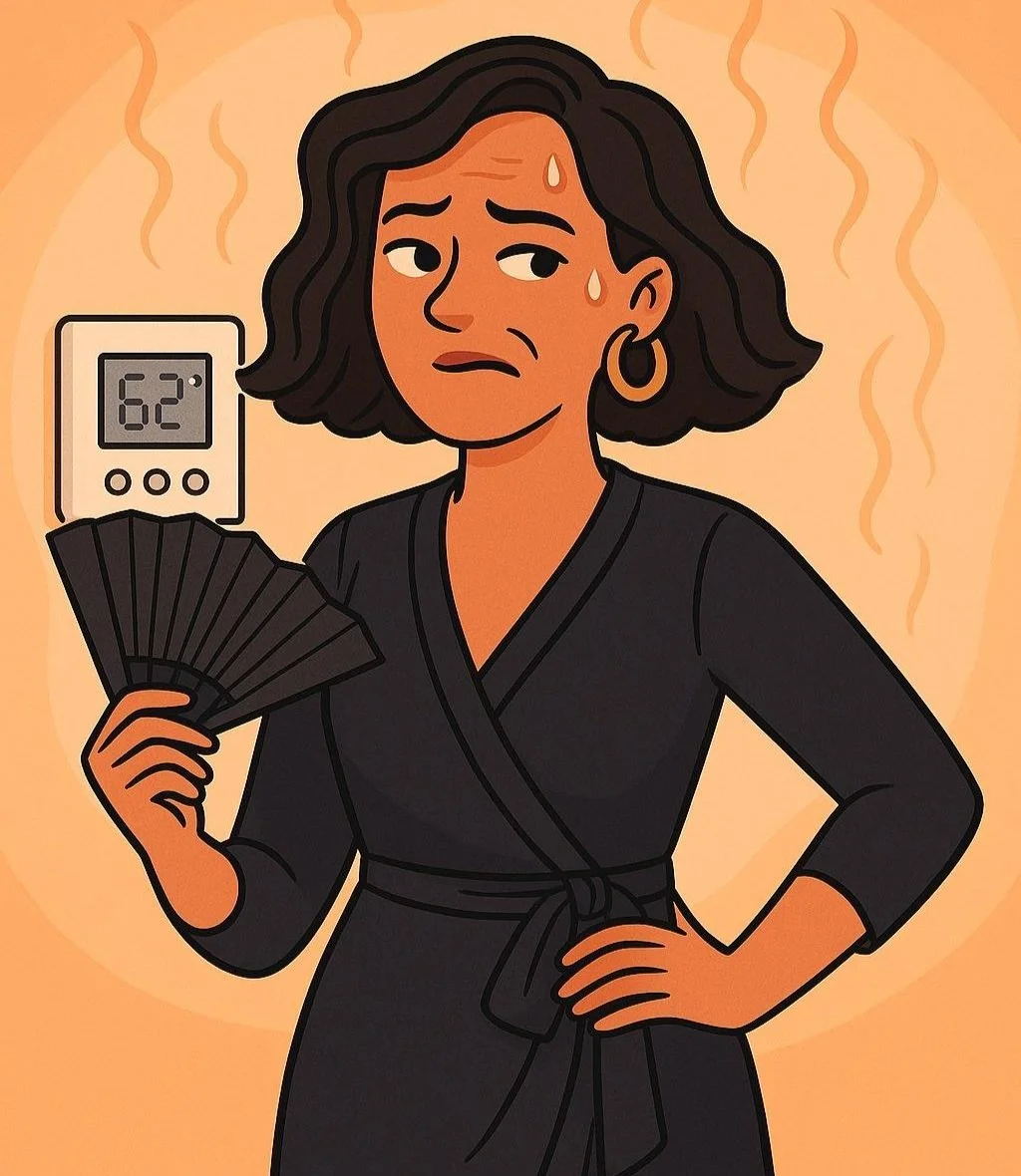Coming in Hot: A Guide to Perimenopause and Menopause
What No One Told You
One minute you’re vibing with your regular cycle. The next, your body is turning up the thermostat without warning, your emotions are on shuffle, and your period is playing hide-and-seek. Welcome to menopause — or more accurately, the long, slow, hot journey leading up to it.
Despite the fact that every person with ovaries will go through it eventually, perimenopause and menopause are still shrouded in silence. So let’s talk about it. Really talk about it.
Menopause Is Not a Light Switch
First, let’s clear something up: menopause is not a sudden stop. It’s not like your ovaries are working full-time one day and packing up their desks the next. Instead, it’s a slow, natural transition — more like an employee easing into retirement. Over time (usually between 4 to 10 years), the ovaries gradually scale back their workload, producing less and less estrogen until, eventually, they officially retire.
That “official” moment is what we call menopause — when someone hasn’t had a period for a full year. But the physical, emotional, and mental changes usually start before that milestone, and can continue long after it.
So yes, even if you’re still getting periods, the mood swings, night sweats, or skin changes you’re noticing might be the early signs. And no, you’re not going crazy. You’re just coming in hot.
The Hormone at the Center of It All
The ovaries’ main job is to produce estrogen. As they wind down, estrogen levels drop — and that dip is what sets off a cascade of changes throughout the body. Menopause doesn’t just affect your uterus. It affects your skin, brain, bones, metabolism, and mood.
Just because menopause is natural doesn’t mean it’s easy. Many people find it deeply disruptive to their quality of life — physically, emotionally, even sexually. But naming it is powerful. Talking about it is step one.
Symptoms: It’s Not Just the Periods
Here’s the reality: menopause can impact almost every part of the body. Some of the most common symptoms include:
Physical Changes:
- Hot flashes and night sweats
- Vaginal dryness and discomfort during sex
- Skin changes (dryness, sensitivity)
- Thinning hair
- Slower metabolism and weight changes
- Joint aches
- Sleep disturbances
Mental & Emotional Changes:
- Brain fog and memory lapses
- Mood swings and irritability
- Anxiety or depression
- Decreased libido
- Fatigue
Every person experiences menopause differently. Some breeze through it. Others feel like their entire body is rebelling. Neither is “right” — but all of it is valid.
When Does It Happen?
The average age of menopause is 51, but averages are just that — averages. Some people reach it in their 40s, others well into their 50s. Genetics, environment, and certain medical conditions or treatments (like chemotherapy or surgical removal of the ovaries) can affect the timeline.
What You Can Do About It
The most important thing? You don’t just have to suffer through it.
Knowing what’s happening to your body — and why — is half the battle. But there are also real ways to manage the symptoms and feel like yourself again.
Lifestyle Tips:
- Dress in layers and keep your bedroom cool for hot flashes
- Move your body in a way that feels good — it helps with mood, sleep, and metabolism
- Prioritize sleep and stress reduction
- Use lubricants and vaginal moisturizers as needed — no shame
Medical Support:
- A multidisciplinary team (gyno, dermatologist, mental health, etc.) can help with system-specific issues
- Non-hormonal prescription medications are available for some symptoms
- There are over-the-counter products without hormones/medication that some people swear by. There are also natural supplements for the holistic girlies, such as: Black Cohosh, Ashwagandha, Red Clover, Soy Isoflavones. These have not been well-studied - and even though they are natural, they can still react with other medications or medical issues - so always consult a provider before trying them.
But let’s be real: the most effective treatment for menopause symptoms — by far — is giving you back the estrogen! Or what we call, hormone replacement therapy (HRT).
Yes, HRT got a bad rap in the past, mostly due to outdated studies and healthcare providers who didn’t explain the risks well. But for most people, HRT is safe, effective, and life-changing — no — life-saving. Don’t let old narratives keep you from getting relief.
To learn more about HRT — including what it is, who it’s for, and how to get started — check out our companion article: “I’ll Have What She’s Having: Hormone Replacement Therapy.”
You’re Not Alone
If no one ever talked to you about this phase, you’re not broken — you’ve just been underserved.
Every person with ovaries will face menopause eventually. You’re not alone, and you’re not “less than.” You’re evolving. And Femanual is here to help you understand your body, feel empowered, and know exactly what to expect when you’re coming in hot.
The post contains affiliate links (because we gotta pay the light bill). As an Amazon Associate, we earn from qualifying purchases at no extra cost to you - but don’t worry: we only recommend products we truly believe in. 
